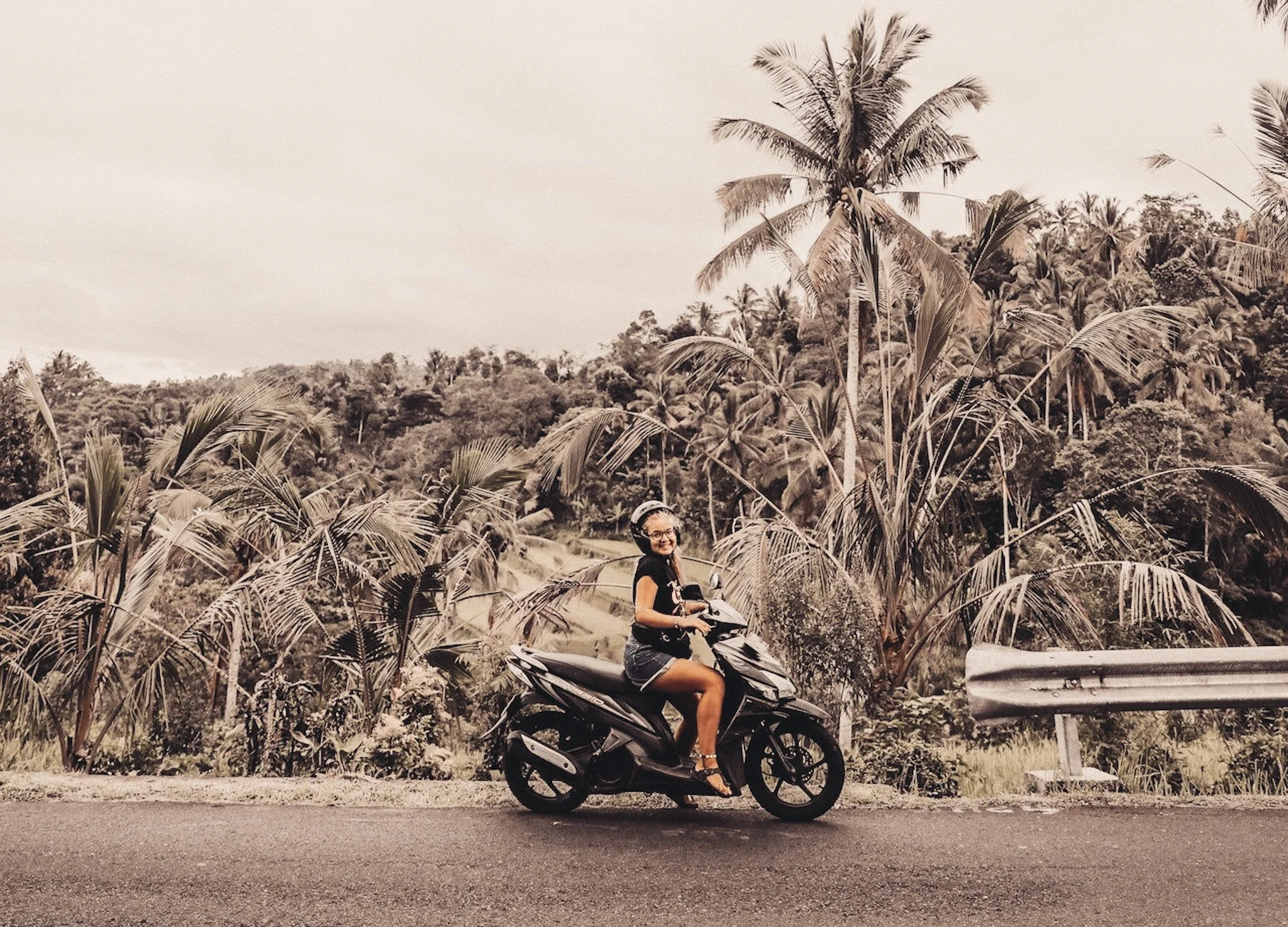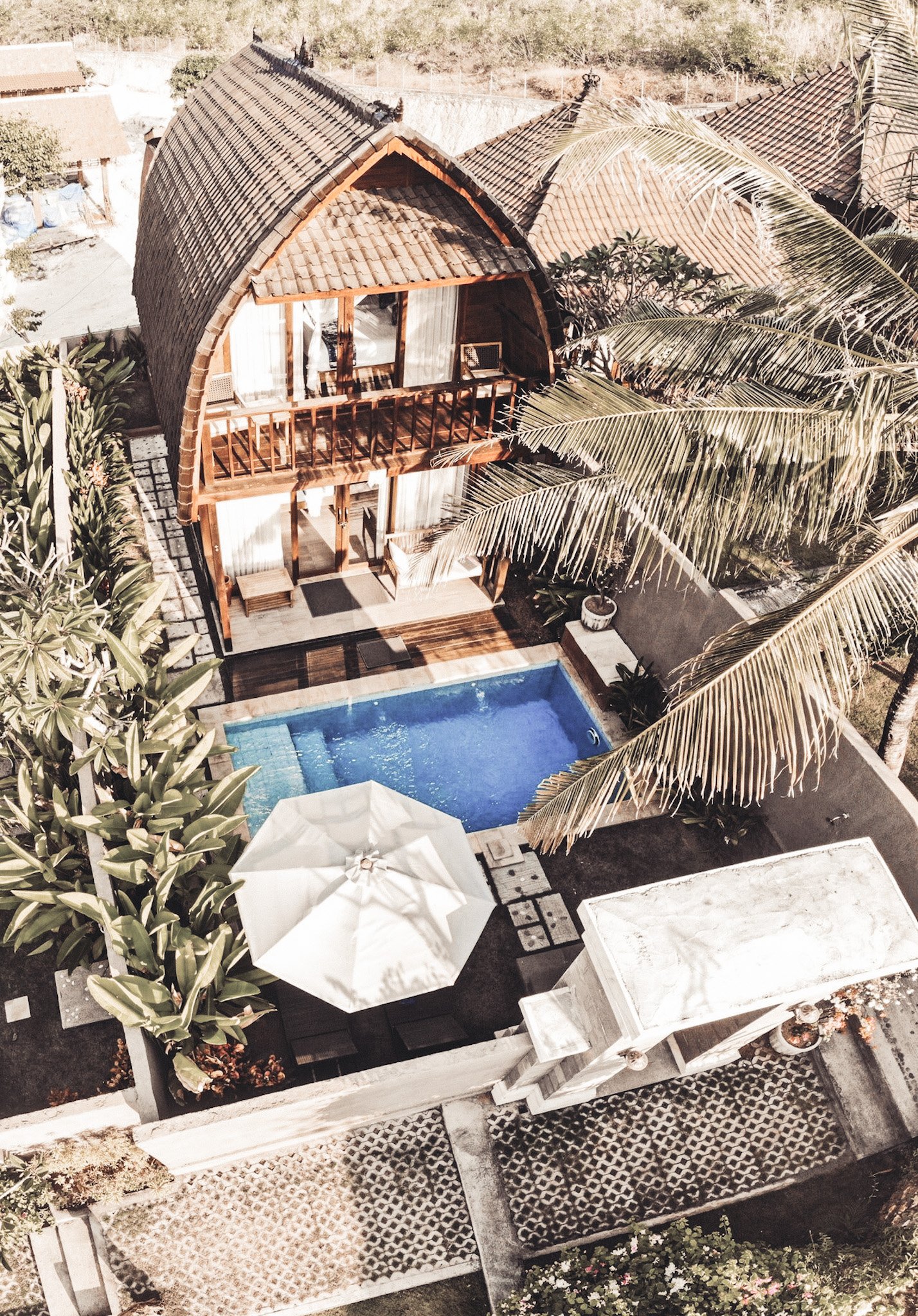Bali Trip Planning Guide: Visas, Getting Around, Money, and Safety Essentials
Bali is the ultimate tropical paradise. It has sun, sand, picturesque views, and it’s all at an affordable price. However, Bali does some things a little differently than you may expect. The more you understand “how they do things” in Bali, the more seamless and safe your trip will be. Here are a few things you should know before traveling to Bali.
In this post I’ll cover everything from:
The most common ways to get around Bali (and what to avoid so you don’t get ripped off!)
Travel visas and how to stay longer than 30 days
Money scams to be aware of (again, so you don’t get ripped off)
Alcohol: Learn what drinks are unsafe, what drinks are more popular, and what drinks you shouldn’t expect to see much of in Bali
Before I start, let me just say, Bali is one of the most incredible places in the world. It’s also one of the top cities in the world for digital nomads, thanks to its thriving coworking culture and expat scene. They have some of THE kindest people in the world. As a solo female traveler who has spent a lot of time in Bali, I can say I feel completely safe there. This blog post is created to bring awareness of “how things operate” so you can have a seamless trip and avoid any situations that could put a damper on your trip.
>> Check out The Ultimate Bali Travel Guide 2025: Best Areas to Visit and What to Do for tips on where to go and what to see while you’re there.
Now, let’s get into it!
Bali Transport: How to Get Around the Island
Scooters are The Most Popular Way to Get Around Bali
The most popular way to get around in Bali is by scooter or motorbike. There are an abundance of places that rent scooters and chances are wherever you are staying has them available for rent. Here’s how much Bali scooter rentals are. These are approximately based on my experience in Bali, just so you can make sure you don’t get ripped off:
Monthly scooter rental 750,000 IDR ($55 USD/ month) ($70 CDN/ month)
Daily scooter rental 60,000 IDR ($4 USD / day) ($5.50 USD/ day)
Scooter Accidents in Bali, AKA the Bali Tattoo
I’ve never heard of a place denying someone a scooter rental even if they don’t have experience. That is an obvious cause for concern especially when you have people coming from the America’s who are used to driving on the other side of the road. You’ll also get people drinking and driver on their scooters in places like Kuta, Canggu, and Seminyak.
As you can imagine, it’s common in Bali to get in at least one little scooter accident. This is often referred to as Bali tattoos or an initiation of sorts. That being said, most accidents are minor, although being covered in bandages and gauze prevents you from enjoying the pools, the ocean, and it’s a little more painful to get around.
Don’t be afraid of driving a scooter, just be careful and smart… WEAR A HELMET!!
It seems like every day there is someone in Bali starting a Go Fund Me because they got in a bad scooter accident and they don’t have the money to pay for their hospital bills because their insurance is refusing to pay.
Caution! Travel Insurance May Not Cover You in Scooter Accidents
Keep in mind, most travel insurance companies will not cover any of your expenses if you are in a scooter accident UNLESS you have a valid scooter license in your home country and an international driving permit (IDP). This is not legal advice and you should always consult your insurance provider for details.
For travel insurance, I use World Nomads for my travel insurance and what I love about them is that you can sign up for the insurance online, even while you’re out of the country. Even with World Nomads, I believe you need a valid scooter license in your home country and an international driving permit so keep that in mind.
How to Get an International Driving Permit
An International Driving Permit (IDP) is a very simple process and takes about all of 10 minutes to get.
Simply go to your AAA, CAA (The DMV may have this too but I’m Canadian so perhaps some of my American readers can confirm in the comments below).
Ask for an international driver's license IDL. What they essentially do is copy the details of your license over to an “international document”.
Bring a recent passport size photo with you. Check your local office for exact size requirements. In my experience, you can get the photo taken at the same location that you get your IDL.
Pay the fee of about $25 USD/ $25 CDN
Boom - you’re done! You have your International Driving Permit!
Legally, to drive a scooter in Bali you should have an IDL. Whether that’s always the case and reality of what people do is another question.
The police in Bali have been known to target tourists, known as “Bule”, and pull them over for not wearing a helmet or not having the proper license. So, it’s always a good idea to have you IDP.
Ubers are Banned in Bali - Use The GoJek App Instead
If you’re not comfortable driving a scooter, you won’t be able to use Uber as it’s banned in Bali. There have been instances where local drivers/taxis will attack Uber drivers for taking away their business. So Uber is not safe or common to use in Bali.
That being said, the Indonesian equivalent of Uber in Bali is GoJek. GoJek is a really common and popular app to use to get around. Keep in mind that with GoJek, the person picking you up will be on a scooter, and you just hop on the back of the scooter. Again, scooters are a quicker way to get around especially since the traffic in Bali is so bad.
That being said, even with GoJek sometimes you may have a driver request that you meet them down the road as there are some locations where they can’t pick you up (again, with the whole local drivers attacking them). So if you’re at The Lawn or Old Man’s and your driver isn’t showing up, it may be best to walk down the road a bit.
Local Scooter Drivers in Bali - Be Careful You Don’t Get Ripped Off
In Bali, you’ll notice guys hanging around in these huts along the road that offer transport on their scooters. They’ll shout ‘Transport?! Transport?!” as you walk by. You can use these guys, however, chances are you’ll get ripped off big time. That’s why it’s better to just rent a scooter and drive yourself or use GoJek.
Renting a Car in Bali is NOT Common
Renting cars in Bali isn’t really a thing so I wouldn’t consider that as an option. However, you can hire a local driver (who yes, is in a car or van). Keep in mind, these hired drivers are different from the scooter guys that hang at the side of the road asking you for transport.
Hiring a Driver in Bali is a Popular Option
Transport for Day Trips
Hiring a Driver in Bali for Day Trips
If you’re looking for airport pickup/dropoff, or want to do a day trip and tour the island, hiring a local driver is a great and popular option. Most drivers are great tour guides, too. They know the good spots to see. These drivers are usually in cars/vans (so not to worry about the whole scooter thing!). That being said, I wouldn’t recommend using a driver for getting around in day-to-day life in Bali, as traffic is really bad. Cars and vans can’t maneuver traffic as well as scooters can.
The Cost to Hire a Driver for Day Trips
Hiring a driver and car for a full day (8 hours) costs about 600,000 IDR ($50 CDN, $55 AUD, and $40 USD). This is the cost for the entire car. Since you do NOT pay “per person”, but rather per car, this is a great option for groups.
Airport Transport
Hiring a Driver in Bali for Airport Pick-up and Drop-off
Once you land at the airport in Bali, you’ll be bombarded by local drivers asking you if you want “transport”. It’s overwhelming, and they’re not known to give fair rates. Your best bet is to arrange a local driver to pick you up beforehand. Your hotel or wherever you’re staying can usually hook you up with a local driver to pick you up. When you arrive at the airport, your driver will be there holding a sign with your name on it, making it pretty easy to coordinate.
The Cost to Hire a Driver for Airport Pick-up and Drop-off
Keep in mind these costs for airport pickup/dropoff are approximate bit should give you a rough idea if you’re being ripped off or not.
Denpasar airport to Canggu is usually around 250,000 IDR - 300,000 IDR
Denpasar airport to Ubud is usually around 300,000 IDR
Denpasar airport to Kuta should be a little less than Canggu because it’s closer to the airport, so maybe 200,000 - 250,000 IDR.
Drivers usually base their rates on where they have come from. That’s why it’s good to coordinate with your hotel/accommodation so you can get a driver that is local to where you’re getting dropped off.
Communicating in Bali
Do they Speak English in Bali? Yes… for the most part.
Locals in Bali speak Indonesian and Bahasa. However, many locals also speak English, given you’re in the popular tourist or digital nomad areas such as Ubud, Canggu, Kuta, and Seminyak. The more rural you go, the less English locals speak. P.S. Duolingo is a great app to learn some Indonesian before you go.
WhatsApp - How Everyone Communicates in Bali
Whether it’s communicating with your hotel or your driver, most people in Bali communicate via WhatsApp. It’s helpful to make sure you have it downloaded before you go.
Bali Visas
For the most part citizens of America, Canada, Australia, and the UK don’t need a visa to enter Bali as a tourist. You can check your eligibility on VisaHQ. Just enter where you’re from and where you’re going and it’ll tell you if you need a visa or not.
How to Stay More than 30 Days in Bali - The Visa On Arrival (VOA)
Tourists in Bali are typically allowed to stay for up to 30 days, depending on your passport. However, if you want to stay to a maximum of 60 days you can get what is called a ‘Visa on Arrival’ VOA. When you arrive at the airport in Bali there is a tiny desk (just before customs) where you can get your Visa on Arrival.
IMPORTANT! This desk is BEFORE customs. If you miss it and don’t get the VOA it before customs you may only be able to stay 30 days or have to deal with a complicated process.
Here’s how to get your visa on arrival in Bali:
Once you land in Bali at the airport, go to the Visa on Arrival desk (BEFORE YOU PASS CUSTOMS)
Ask for the Visa on Arrival
Pay about $25 USD/ $35 CDN. I’m not sure if they accept foreign currency so it may be a good idea to have IDR cash on you. Last time I was there they accepted credit card for payment.
There is no need to get the VOA ahead of time. In fact, I’m not even sure if you can. You can get it at the airport once you’ve got off your plane. If you can’t find the visa on arrival desk just ask someone where the stand is for visa on arrival.
IMPORTANT - don’t think just because you have your VOA that you’re in the clear. Within a couple of weeks of arriving in Bali you’ll want to contact a visa agent to process the VOA. The place where you’re staying can help you with this or you can contact me and I can send you a visa contact. Here’s what to do:
Contact a visa agent
The visa agent will send a driver on a scooter to come pick up your passport. Yes, give your passport to this person. Even though it seems sketchy it’s the way they do things.
Pay the visa agent fee for their services is approx. 650,000 IDR ($45 USD / $60 CDN). You can usually pay that before or after. It’s usually cash.
Go to the immigration office in Denpasar. The visa agent will then request you go to the immigration office in Denpasar on a specific date and time.
Hire a driver or get a GoJek to take you to/from the immigration office. Keep in mind that the roads leading to the immigration office are more like highways (in Bali standards). So if you’re not comfortable on a scooter it’s a good idea to hire a driver.
What to expect at immigration
Your visa agent will let you know who will be meeting you at the immigration office - it will be one of the staff members. Your visa agent will typically give you their WhatsApp number so you can contact them if needed.
You’ll wait in line until your number is called (your visa agent will usually get this for you before you arrive).
Once they call you you’ll go get your photo taken and fingerprints.
Leave immigration - your visa agent will take care of the rest.
Get your passport and VOA dropped back off to you. A few days or a week later your visa agent will arrange for a driver to drop off your passport with your VOA.
All done!
Important! If you want to stay longer than 30 days make sure you contact you visa agent shortly after arriving in Bali so they have enough time to process everything. The VOA needs to be processed within 30 days if you want to stay for up to 60 days.
Again, none of this is to be taken as legal advice. This is simply based on my experience. Contact a professional for advice on what option is best for you.
Money and Scams in Bali
ATM Scams and Skimming
Bali is known to have an issue with skimmers on ATM machines especially in tourist hotspots. This means they put a special skimming device on the ATM so they can skim your card and get access to your account. The best way to avoid this is to use an ATM that is inside of a bank.
Tip: For added security to protect your bank account:
Download your bank mobile app
Turn notifications ‘on’ for every time a withdrawal is made on your account.
Now, every time money is taken out of your account you’ll get a notification on your phone.
What You Should Know about ATMs in Bali
Keep in mind that most ATMs in Bali limit how much you can withdrawal to approx. 2,000,000 IDR ($140 USD / transaction) ($188 CDN/ transaction) So, if you want to take out more you’ll have to make multiple withdrawals.
Be careful doing multiple transactions back to back as it could be a flag to your bank and your bank may block your card. It’s always a good idea to call your bank beforehand and let them know.
The ATMs will also charge you about $5 CDN / $3 USD per transaction.
What Currency to Use in Bali
The accepted currency in Bali is Indonesia's Rupiah (IDR). Locals don't really accept USD. It’s not really a “thing”.
Using Credit Cards in Bali
If you want to use a credit card you’ll usually be charged an extra 2-3% fee. So just a heads up. They’re not ripping you off it’s just how things work on the island.
Use Caution with Local “Currency Exchanges”
Since Bali uses Indonesian Rupiah (IDR) your best bet is to bring some IDR cash with you or use ATMs in Bali to take out cash. I do not suggest trying to convert your money at a local currency exchange once you arrive as you’ll probably get ripped off. I don’t know of anyone in Bali that really uses local currency exchanges anyways.
Ordering Indonesian Rupiah (IDR) in Your Home Country
While you’re in your home country, go to a currency exchange store and get enough IDR for the first day or two of being in Bali, just so you have some cash on hand. I recommended at least 2,000,000 IDR ($150 USD) ($190 CDN) as a minimum. You certainly won’t spend this much in a day in Bali but it should cover the costs for your driver, visa on arrival, you scooter rentals etc
For currency exchange, I use Continental Currency Exchange in Canada. Whichever currency exchange you use in your home country, just be mindful that you may have to call to special order IDR, as not all places carry a lot of Indonesian Rupiah. This could take a few days, upwards to a week. So, plan ahead!
Be Cautious with Alcohol in Bali
Ok, let’s talk about alcohol. Long story short you need to be careful with some of the alcohol in Bali. Sometimes some places will serve “fake” liquor that has methanol in it. And if you don’t already know too much methanol can kill you.
Here’s the lowdown on your alcoholic options:
Beer: It’s the “safest” and cheapest choice.
The popular “go to” beer in Bali is Bintang. It’s about 25,000 IDR for a beer ($1.75 USD or $2.30 CDN) upwards to 50,000 IDR ($3.50 USD or $4.70 CDN) depending if you’re at a “fancy” place. Beer is a “safe” when it comes to alcohol as in it’s not usually tainted or fake.
Wine: It’s NOT common in Bali.
Wine is not common in Bali. It’s more expensive, there are few options and the quality isn’t known to be the best. Of the limited wine available, Plaga seems to be a commonly available one. That being said, Bali has been booming with tourists now for a long time so I imagine wine options will improve over time.
Liquor: Be careful!
Be careful with liquor in Bali. This includes vodka, rum - all liquors. Sometimes places will serve fake liquor with methanol in it. Again, if you don’t already know, too much methanol can kill you. Even some seemingly legit places will do this. Be hyper cautious of this “fake” liquor especially at more local places. I personally love rum so sometimes I’ll get one, but I’ll only get 1 or 2 max then switch to beer. An alternative is to bring a bottle of legit liquor from home or pick it up at the duty free.
And Don’t Do Drugs…
Oh and if it’s not obvious or you are unaware, Bali has some of the harshest penalties for drugs so don’t bother trying to sneak some in or getting some while you’re here. You’re in a different country and they operate on their own rules. Capital punishment is legal for drug trafficking, distribution, and possession of large quantities. Individuals convicted of trafficking may face life in prison or execution by firing squad, as we’ve seen with cases like the Bali Nine. Some people have been executed as recently as 2016, but new laws from 2023 now give those on death row a chance to have their sentence reduced. If they go 10 years without being executed and show good behavior, the death sentence can be changed to life in prison instead.
There you have it, that’s what you should know before traveling to Bali in terms of getting around, communicating, visas, money, and alcohol, so you can have a safe and seamless trip in Bali.
Want to work remotely while exploring Bali? Grab my FREE Remote Career Playbook to learn the 6 steps to land a remote job and build a life of freedom.






